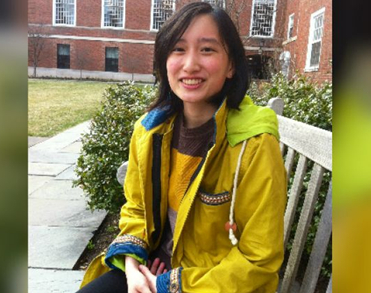Yale has threatened to kick out a 20-year-old history major because she's too thin. New Jersey native, Frances Chan, who is 5'2" and weighs 90lbs, claims she's been force feeding herself Cheetos and ice cream in an attempt to add flesh to her tiny frame after the Ivy League school became convinced she was suffering from an eating disorder.
耶魯大學(xué)向?qū)W生弗朗西絲-陳提出了勸退警告,因?yàn)樗萘恕=衲?0歲的弗朗西絲-陳是新澤西當(dāng)?shù)厝耍敶髮W(xué)歷史學(xué)專(zhuān)業(yè)學(xué)生,身高5英尺2英寸(約1.57米)、體重90磅(約40.8公斤)。陳說(shuō)這所常春藤名校稱(chēng)她飲食失衡,強(qiáng)制要求她增肥,所以她不得不強(qiáng)迫自己吃奇多和冰淇淋,只希望給自己的小身體長(zhǎng)點(diǎn)肉。
Chan said the college wouldn't even let up when her parents confirmed she, and the rest of her family, had always been naturally skinny and even sent in childhood medical records and had their doctor contact the school.
陳說(shuō)她的家長(zhǎng)向?qū)W校證實(shí)她們一家人都自然偏瘦,甚至還把她童年的醫(yī)療記錄寄到學(xué)校、并請(qǐng)家庭醫(yī)生聯(lián)系了校方,但學(xué)校還是不肯讓步。

'It felt really bad to be this powerless,' Chan told the New Haven Register. 'I ate ice cream twice a day. I ate cookies. I used elevators instead of walking up stairs. But I don't really gain any weight.'
“我感到如此無(wú)力、非常糟糕!” 陳告訴《紐黑文記事報(bào)》的記者,“我每天吃?xún)纱伪苛埽€吃許多甜點(diǎn),并且用電梯代替走步,可是我就是很難增重。”
She said the battle over her weight began in September when she noticed a lump in her breast and went to get it checked out. The lump came back benign, but Yale doctors called her in for a follow up appointment because they had other 'concerns.'
她說(shuō),去年九月她發(fā)現(xiàn)自己胸部有腫塊,于是去看了校園醫(yī)生。檢查結(jié)果表明腫塊是良性的,但后來(lái)耶魯醫(yī)生約她再次前往就診,因?yàn)樗麄儭坝袆e的擔(dān)心”。于是,針對(duì)她體重過(guò)輕的爭(zhēng)論開(kāi)始了。
In the meeting, they told her she was dangerously underweight and imposed mandatory weekly weigh-ins as well as sessions with a mental health professional and a nutritionist.
在會(huì)診中,校醫(yī)說(shuō)她體重嚴(yán)重過(guò)輕,并強(qiáng)制她每周增重,同時(shí)輔助以心理專(zhuān)家和營(yíng)養(yǎng)師輔導(dǎo)。
Chan tried to comply with the school's request and put on weight but she only managed to gain two pounds. However, the university said that wouldn't do.
陳曾試圖遵從學(xué)校的要求努力增重,但是她勉強(qiáng)增了2磅(0.9公斤)。然而學(xué)校卻說(shuō)這樣還是不行。
Angry, helpless and distracted from her studies, Chan decided to pen an essay about her experience for the Huffington Post. In it she explains that she's been small 'since high school, but it has never led to any illnesses related to low weight or malnutrition.'
陳既生氣又無(wú)助,無(wú)心學(xué)習(xí),于是決定執(zhí)筆把自己的經(jīng)歷寫(xiě)給《赫芬頓郵報(bào)》。她在文章中說(shuō),她“自從中學(xué)就體型嬌小,但從來(lái)沒(méi)有因?yàn)轶w重過(guò)輕、營(yíng)養(yǎng)不良而生病。
She claims the university's blind use of Body Mass Index as a yard stick for a healthy weight is where they are going wrong.
她說(shuō)耶魯大學(xué)的錯(cuò)誤就在于,盲目使用身體質(zhì)量指數(shù)作為衡量健康的標(biāo)準(zhǔn)。
On Friday, she learned that her new doctor acknowledged BMI was not the only measure of a healthy weight and admitted the college had 'made a mistake' in how they handled her thin frame.
周五,陳從自己的新任醫(yī)生那里了解到,身體質(zhì)量指數(shù)不是衡量健康體重的唯一標(biāo)準(zhǔn),學(xué)校在對(duì)于她“過(guò)輕”體重那些處理方法確實(shí)“犯了個(gè)錯(cuò)誤”。












